Foods That Help Kids Grow Taller: 12 Growth-Boosting Foods
Look to these edibles to provide proper nutrition to your child for optimal growth.
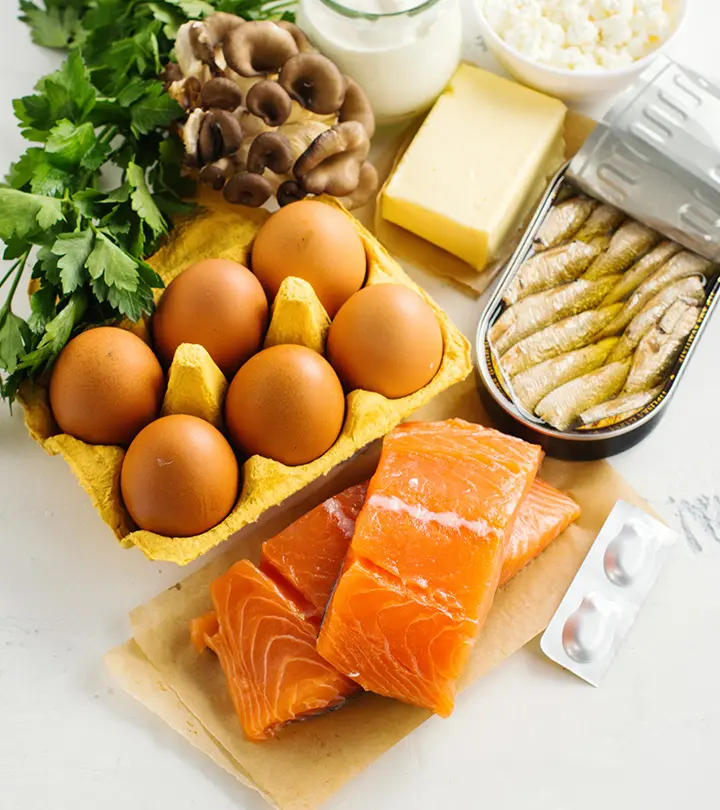
Image: ShutterStock
Genetics determines 80% of the height of an individual (1). However, as per studies, environmental factors (like nutrition and lifestyle) may also influence the height of an individual in their growing years (2). Intake of foods that help kids grow taller may provide the much-needed boost to their growth.
While we cannot do much about genes, we can ensure to provide proper nutrition to kids to facilitate their growth. In this article, we have listed foods that can aid the overall physical development of your kid, may stimulate the production of the growth hormone, and aid bone growth.
In This Article
Height is a non-modifiable factor, and the height of a child is mostly dependent on the parents’ height. If both the parents are tall, the child is likely to be tall.
Jesse Feder, Clinical Dietitian at the Memorial Regional Hospital, says, “Kids can get taller naturally by consuming a healthy, well-balanced diet that is rich in calcium, phosphorus, magnesium, and vitamin D.”
Children tend to grow in spurts and have a slightly increased growth rate between 6-8 years. About 25% of growth in height occurs during puberty (3). Two hormones contribute to this – the Human Growth Hormone (HGH) and Insulin-like Growth Factor-1 (IGF-1), which determine longitudinal bone growth and maintain bone mass (4). While there are no foods that increase height rapidly, they may help stimulate the production of the growth hormone and aid in bone growth.
Austin Wayne, a YouTuber, attributes his successful height gain journey to a healthy diet that incorporates foods such as grass-fed milk, organic butter, low glycemic fruits, and intermittent fasting. In one of his personal vlogs, he notes, “From the ages of about 17 to 18, I grew from 5’9 to 6’4 in about a year (i).” He continues, “If you are committed to not just height growth but your overall health, you will have to invest in your body. You’re going to have to buy natural, organic, healthy, raw foods.”

Key Takeaways
- Proper nutrition and a healthy lifestyle are two important factors for increasing height.
- Poultry, green leafy vegetables, and dairy have essential nutrients such as proteins and vitamins that might help in growing taller.
- Consuming sugar may lead to obesity and diabetes, and adversely affect the body’s potential growth.
- Proper posture and optimum sleep might help increase height.
- Incorporate exercise into the daily routine.
Best Foods To Help Children Grow Taller
1. Eggs
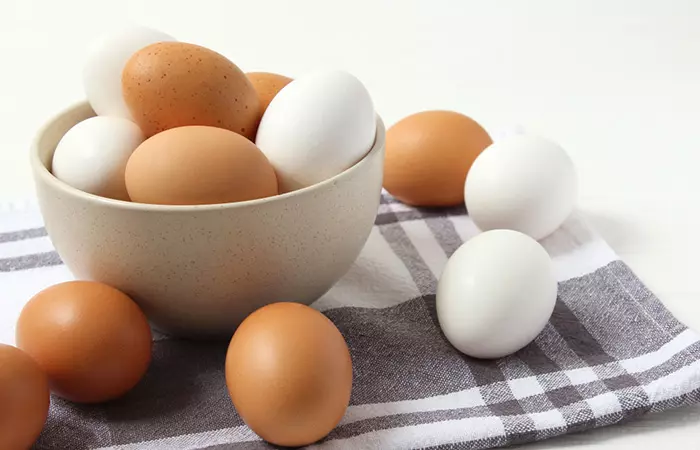
Eggs are incredible sources of protein,riboflavini Also called vitamin B2, it is a water soluble vitamin and is flushed out of the body through urine when present in excess. , biotin, and iron. Protein helps in cell growth and development. A study showed that malnourished children who were fed with a high-protein diet over a period developed more height compared to those who were fed with standard protein (5).
Egg white is a concentrated source of protein. Make sure to include eggs almost every day in your child’s meal. Having a yummy omelet or a boiled egg for breakfast is a great way to start their day and ensure they get proteins. However, check for any allergic symptoms using the 3-7 days trial rule.
2. Dairy And Dairy Products
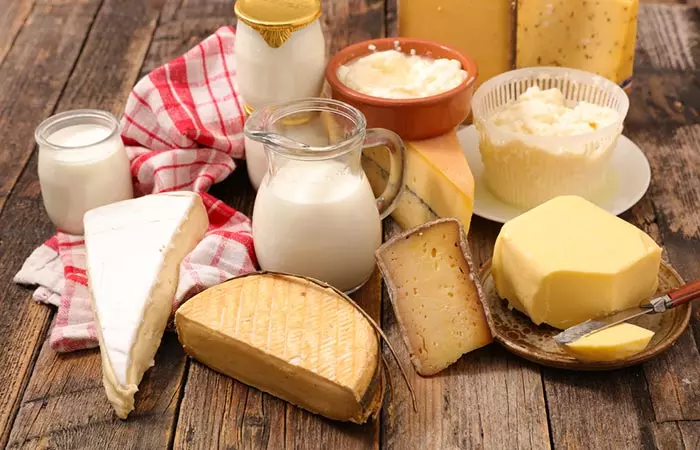
Milk contains calcium and protein, which aid the growth of bones and also develop strength. Dairy products like cheese, yogurt, curd, and cottage cheese are abundant in calcium and vitamins, which are important for bone mineralization in children (6). Get your kids to drink milk every day or make dishes that are filled with the goodness of milk.
Note: If your child has lactose intolerance, replace cow’s or buffalo’s milk with any plant-derived milk after consulting with a pediatrician.
3. Soybeans
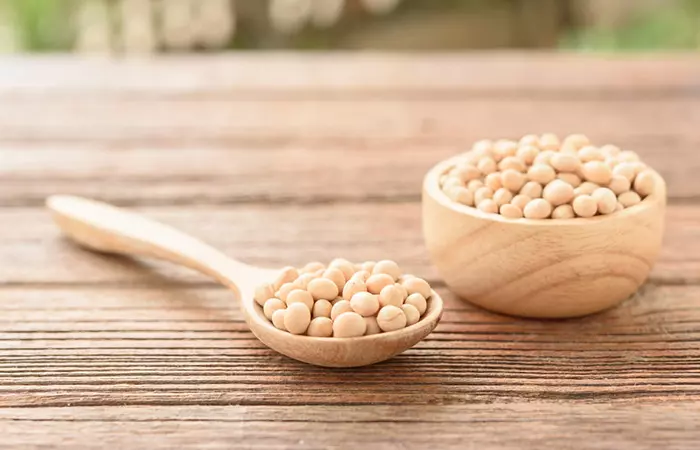
Soybeans are rich in proteins. While they are likely to be useful in improving optimal bone health, the mechanisms are still not clear (7). You can create many yummy dishes with soybeans that your kids will relish.
4. Chicken
Poultry meat is a good source of protein, along with B vitamins (mainly thiamini Also called vitamin B1, it is an essential water-soluble micronutrient that has to be taken through food or dietary supplements. , Vitamin B6, and pantothenic acidi Also called vitamin B5, it is a water-soluble vitamin naturally present in some foods and available as a dietary supplement. )
(8). Studies on the physical growth of young children belonging to low-income groups show that good quality animal protein is required to accelerate growth and development (9). You can try out different recipes that include chicken to improve the protein intake of your child.
 Quick Tip
Quick Tip5. Green Leafy Vegetables
Green leafy vegetables not only give your kids strength but also supply a good amount of calcium.
The calcium in these vegetables (Chinese cabbage, kale, and broccoli) balances bone resorption (breaking down of tissue in the bone to release minerals) and deposition (building of tissue in the bone by deposition of minerals), which varies according to age (10). In children and adolescents, bone formation is more than resorption, which supports bone growth.
Spinach is rich in iron – 1 cup (180 g) of spinach provides 6.43 mg of iron, which meets 36% of DV (11). You can add green leafy vegetables to soups and stews, pasta, smoothies, and guacamole.
6. Carrots
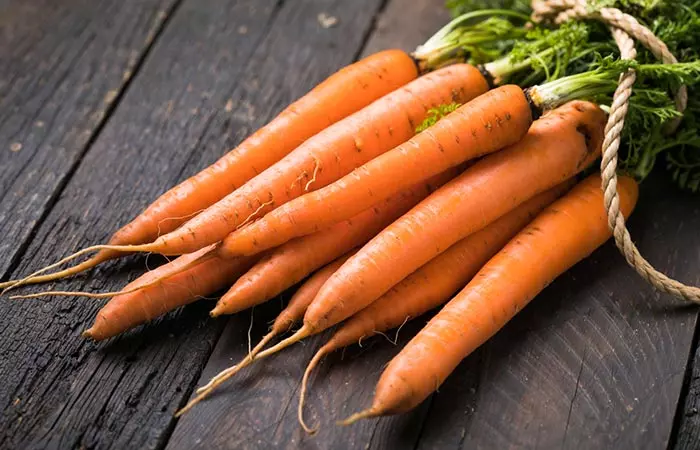
Carrots are rich in beta-carotenei A pigment that gives fruits their yellow or orange color and gets converted into vitamin A as needed by the body. , which is converted by the body into vitamin A. Adding raw carrots to the diet helps the body absorb calcium more efficiently, which influences bone resorption and keeps them healthy (12). Add raw carrots to salads or make fresh carrot juice for your kids.
7. Fruits
Fruits are rich in vitamins and minerals, essential micronutrients that boost immunity and accelerate growth and development (13). Make it a habit to give your child 1-2 servings of fruit daily. You can also add them to cereals to make them colorful and tasty. Include different varieties of fruits every day to meet the daily requirements.
Jesse says, “Although bananas are healthy, they only contain a small amount of magnesium that can contribute to an increase in height. However, they should still be part of a healthy diet if enjoyed.”
8. Whole Grains
Whole grains are rich in vitamin B, magnesium, selenium, zinc, and iron and contain a small amount of calcium. All these minerals are essential for bone growth and mineralization (14). You can give your kids whole-grain bread and pasta as well as cereals.
9. Yogurt

Yogurt is nutrient-dense and a good source of protein, calcium, vitamin D, andzinc (15). A study suggested a positive correlation between probiotic intake and growth and the development of undernourished children (16). However, more research is needed to establish this. If your kids are not fans of yogurt, get them to eat cheese instead as it is rich in proteins, calcium, and vitamin D.
 Quick Tip
Quick Tip10. Mixed Nuts
Nuts are powerhouses of nutrients and contain vitamins, minerals, healthy fats, and proteins. So, how can these nutrients help? Well, you need vitamins to grow taller, and omega-3 fatty acids are beneficial for bone health and turnover (17). The proteins in nuts are also vital for the growth of your kid. Include nuts (15 g) as a snack or add them to cereals. You can powder nuts and add them to porridges.
Note: If your kid has nut allergy or intolerance, check with a pediatrician before introducing any new foods.
11. Pulses And Beans
Pulses and beans are excellent sources of protein but have a limiting amount of amino acids(18). If combined with cereals, in the form of khichdi or any other dish, they aid good digestion as well as proper growth.
12. Almonds
Almonds are packed with essential nutrients such as protein, calcium, healthy fats, vitamins, and minerals that are vital for bone health and development and may help kids grow taller. Research shows that consuming almonds may help prevent the growth of osteoclasts (body cells that destroy bone tissue), thus aiding bone health (19). This suggests that it may indirectly aid growth by keeping the bones growing until they reach their maximum growth potential. However, relying solely on almonds to increase your height is not recommended.
While scientific evidence is limited to support the claim that almonds or any other specific food may increase the height of kids, a balanced diet, filled with healthy food like almonds, may provide the necessary nutrients for overall health and well-being, ensuring that individuals reach their maximum height potential based on their genetic predisposition.
Foods To Avoid
According to Jesse, “Sugar does not increase height. In fact, eating a diet high in sugar can contribute to stunted growth, diabetes, obesity, and other health issues.”
Excessive sugar consumption can significantly impact a child’s health. High levels of sugar intake have been linked to dental carries and even long-term health problems like obesity and diabetes (20). Obesity can affect a child’s growth and development, leading to issues such as low self-esteem and social difficulties (21).
As we have seen, proper nutrition is extremely important for the growth and development of children. But there are certain foods that can have detrimental effects on their health. Avoid chocolates, pastries, chips, cookies, French fries, etc. Though they may taste great, they are loaded with free sugars, trans fats, and refined carbs, which affect the health of your child. Consuming too much of processed foods inhibits nutrient absorption, which is essential for growth.
You can allow these foods as a treat or as a part of a cheat meal but not on a regular basis.
Others Tips To Follow
- Make regular exercise a part of the daily routine of your child. Exercises like swimming and spot jumping and yoga poses, like the Surya Namaskar, can help lengthen the spine.
- Encourage your child to play games like basketball or volleyball. Continuous running in these sports stimulates the brain center to secrete the growth hormone (GH), a positive response to facilitate somatic growth (22). Playing during early morning or evening helps your body absorb sunlight, which is important for bone growth.
- Proper sleep is very important to stimulate growth and development. A study showed that sleeping at night for longer helped to stimulate the secretion of the growth hormone (GH) (23). Establish a disciplined waking-sleeping routine to aid your child’s physical development.
- Maintaining good posture is very important. Slumping or slouching may cause pain in the neck and back and affect your child’s height. Hence, it is important to monitor their posture while they sit, stand, or sleep.
- Check with the pediatrician if your kid needs any supplements to enhance growth. Ensure you take them for quarterly check-ups to monitor their overall health.
Ensuring kids receive the right nutrients is important for supporting their growth and development. Scroll down to know how to integrate these into daily meals of your child.
Practical Ways To Integrate Height-Boosting Foods Into Your Kids’ Daily Meals
- Serve fortified cereals with regular or almond milk to supply essential minerals like calcium and vitamin D.
- Add lean proteins like turkey, grilled chicken, or tofu to salads or sandwiches along with leafy greens like spinach for an iron boost.
- Nuts and seeds, such as sunflower seeds, walnuts, or almonds, make for delicious and healthy wholesome snacks.
- Add bone broth or soups, rich in collagen and nutrients, to their diet.
- Dark chocolate contains magnesium that may promote bone health. It can be added to their diet but in moderation.
Infographic: 5 Must-Have Foods For Children To Boost Their Height
Childhood is a crucial stage of our lives where significant growth and development takes place. Therefore, caregivers must help their children make nutritious food choices to ensure they reach a healthy height.
The infographic below describes the top foods that can help boost children’s height. Check it out now! Illustration: StyleCraze Design Team
Height is primarily influenced by genetics, but nutrition and lifestyle are also crucial factors in promoting growth. Hence, preparing a balanced diet, including eggs, dairy products, soybeans, chicken, green leafy vegetables, and fish rich in omega-3 fatty acids, is crucial to increase kids’ height.
In addition, carrots, fruits, whole grains, yogurt, mixed nuts, pulses, and beans also help promote height. Also, encouraging the kids to play games like basketball and volleyball, helping them maintain a good posture, and promoting daily exercise exhibit a positive impact on their height.
Frequently Asked Questions
Can I still grow taller at 18?
Humans reach their final height between the ages of 18 and 20 and stop growing after that. There are growth plates at the end of the long bones in your body that proliferate to make you taller. These growth plates usually stop growing after you reach 18 years of age.
What things affect height?
Genetics, hormonal changes, medical conditions, diet and nutrition, and physical activity affect height.
Does drinking milk make you taller?
Milk contains nutrients like protein and calcium that make the bones grow healthily. But, this is only for children and teens.
What’s the normal height for a 12-year-old?
The average height for a 12-year-old female is 55-64 inches (4’6-5’3) and for a male is 54-63.5 (4’5-5’3) inches.
Illustration: Best Foods To Help Children Grow Taller
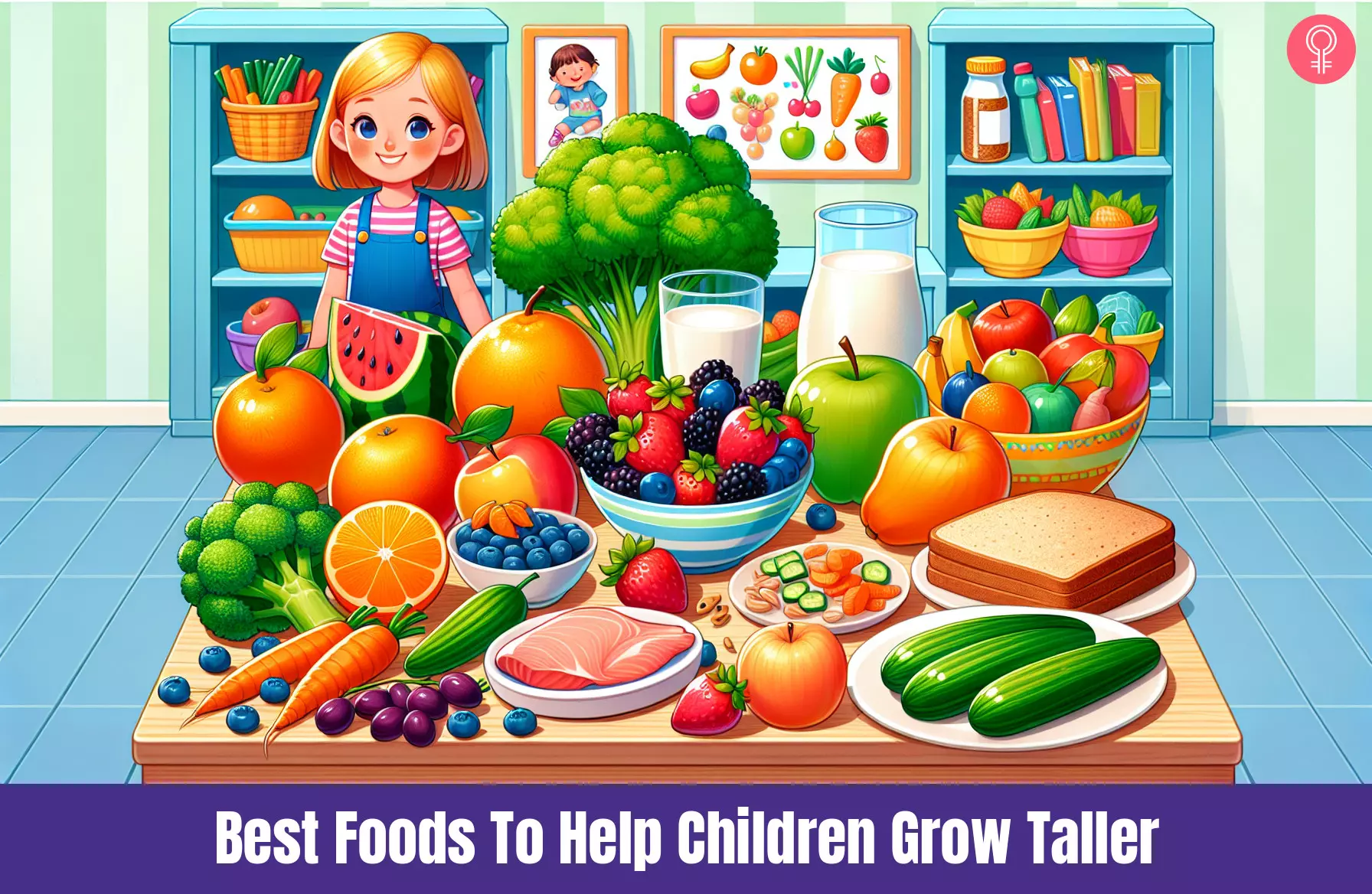
Image: Dall·E/StyleCraze Design Team
Learn more about planning an effective diet to help you become taller. Watch this video to discover which foods can help you reach your full potential.
Personal Experience: Source
StyleCraze's articles are interwoven with authentic personal narratives that provide depth and resonance to our content. Below are the sources of the personal accounts referenced in this article.
i. The Exact FOODS I Ate To GROW TALLER | Austin Waynehttps://www.youtube.com/watch?v=cxd3DPi-ACQ
References
Articles on StyleCraze are backed by verified information from peer-reviewed and academic research papers, reputed organizations, research institutions, and medical associations to ensure accuracy and relevance. Read our editorial policy to learn more.
- Is height determined by genetics? Genetic Home Reference, US National Library of Medicine, National Institutes of Health.
https://medlineplus.gov/genetics/ - Determinants of variation in adult body height, Journal of Biosocial Science, US National Library of Medicine, National Institutes of Health.
https://pubmed.ncbi.nlm.nih.gov/12664962/ - Physical Changes During Puberty, American Academy of Paediatrics.
https://www.healthychildren.org/English/ages-stages/gradeschool/puberty/Pages/Physical-Development-of-School-Age-Children.aspx - Growth Hormone, Insulin-Like Growth Factors, and the Skeleton, Endocrine Reviews, US National Library of Medicine, National Institutes of Health.
https://www.ncbi.nlm.nih.gov/pmc/articles/PMC2726838/ - Increased height gain of children fed a high-protein diet during convalescence from shigellosis: a six-month follow-Up study, The Journal of Nutrition, US National Library of Medicine, National Institutes of Health.
https://pubmed.ncbi.nlm.nih.gov/9772137/ - Impact of dairy products and dietary calcium on bone-mineral content in children: results of a meta-analysis, Bone, US National Library of Medicine, National Institutes of Health.
https://pubmed.ncbi.nlm.nih.gov/18539555/ - Soy foods: are they useful for optimal bone health? Musculoskeletal Disease, US National Library of Medicine, National Institutes of Health.
https://www.ncbi.nlm.nih.gov/pmc/articles/PMC3383497/ - Role of poultry meat in a balanced diet aimed at maintaining health and wellbeing: an Italian consensus document, Food & Nutrition Research, US National Library of Medicine, National Institutes of Health.
https://pubmed.ncbi.nlm.nih.gov/26065493/ - Effects of protein or amino-acid supplementation on the physical growth of young children in low-income countries, Nutrition Reviews, US National Library of Medicine, National Institutes of Health.
https://www.ncbi.nlm.nih.gov/pmc/articles/PMC5914345/ - Calcium, Office of Dietary Supplements, U.S. Department of Health & Human Services, National Institutes of Health.
https://ods.od.nih.gov/factsheets/Calcium-HealthProfessional/ - Nutritive Value of Spinach, cooked, boiled, drained without salt, US Department of Agriculture.
https://fdc.nal.usda.gov/fdc-app.html#/food-details/168463/nutrients - Vitamin A influence on calcium metabolism and calcification, Annals of the New York Academy of Sciences, US National Library of Medicine, National Institutes of Health.
https://pubmed.ncbi.nlm.nih.gov/6940490/ - Role of micronutrients for physical growth and mental development, Indian Journal of Paediatrics, US National Library of Medicine, National Institutes of Health.
https://pubmed.ncbi.nlm.nih.gov/14979388/ - Bone Health and Osteoporosis: A Report of the Surgeon General, US National Library of Medicine, National Institutes of Health.
https://www.ncbi.nlm.nih.gov/books/NBK45523/ - Nutritive elements found in yogurt and fruit that may have an impact on diet-related disease prevention alone and in combination, Advances in Nutrition, US National Library of Medicine, National Institutes of Health.
https://www.ncbi.nlm.nih.gov/pmc/articles/PMC5227968/ - Effects of probiotics on child growth: a systematic review, Journal of Health, Population, and Nutrition, US National Library of Medicine, National Institutes of Health.
https://www.ncbi.nlm.nih.gov/pmc/articles/PMC5025996/ - A New Insight to Bone Turnover: Role of ω-3 Polyunsaturated Fatty Acids, The Scientific World Journal, US National Library of Medicine, National Institutes of Health.
https://www.ncbi.nlm.nih.gov/pmc/articles/PMC3834626/ - Pulses: an overview, Journal of Food Science and Technology, US National Library of Medicine, National Institutes of Health.
https://www.ncbi.nlm.nih.gov/pmc/articles/PMC5336460/ - Postprandial effects of almond consumption on human osteoclast precursors–an ex vivo study
https://pubmed.ncbi.nlm.nih.gov/20947104/ - Sugar in Infants Children and Adolescents: A Position Paper of the European Society for Paediatric Gastroenterology Hepatology and Nutrition Committee on Nutrition
https://pubmed.ncbi.nlm.nih.gov/28922262/ - The influence of childhood obesity on the development of self-esteem
https://pubmed.ncbi.nlm.nih.gov/19728582/ - Effects of continuous and interval running training on serum growth and cortisol hormones in junior male basketball players, Acta physiologica Hungarica, US National Library of Medicine, National Institutes of Health.
https://pubmed.ncbi.nlm.nih.gov/12666876/ - Growth hormone release during sleep in growth-retarded children with normal response to pharmacological tests, Archives of Disease in Childhood, US National Library of Medicine, National Institutes of Health.
https://www.ncbi.nlm.nih.gov/pmc/articles/PMC1544940/
Read full bio of Reda Elmardi
- Jesse Feder, RDN/LDN, is a Clinical Dietitian at the Memorial Regional Hospital. He is also a certified by the American College of Sports Medicine as a personal trainer (ACSM-CPT) and the National Strength and Conditioning Association as a Certified Strength and Conditioning Specialist (NSCA-CSCS).
 Jesse Feder, RDN/LDN, is a Clinical Dietitian at the Memorial Regional Hospital. He is also a certified by the American College of Sports Medicine as a personal trainer (ACSM-CPT) and the National Strength and Conditioning Association as a Certified Strength and Conditioning Specialist (NSCA-CSCS).
Jesse Feder, RDN/LDN, is a Clinical Dietitian at the Memorial Regional Hospital. He is also a certified by the American College of Sports Medicine as a personal trainer (ACSM-CPT) and the National Strength and Conditioning Association as a Certified Strength and Conditioning Specialist (NSCA-CSCS).
Read full bio of Priyanka Sadhukhan
Read full bio of Arshiya Syeda
Read full bio of Aparna Mallampalli









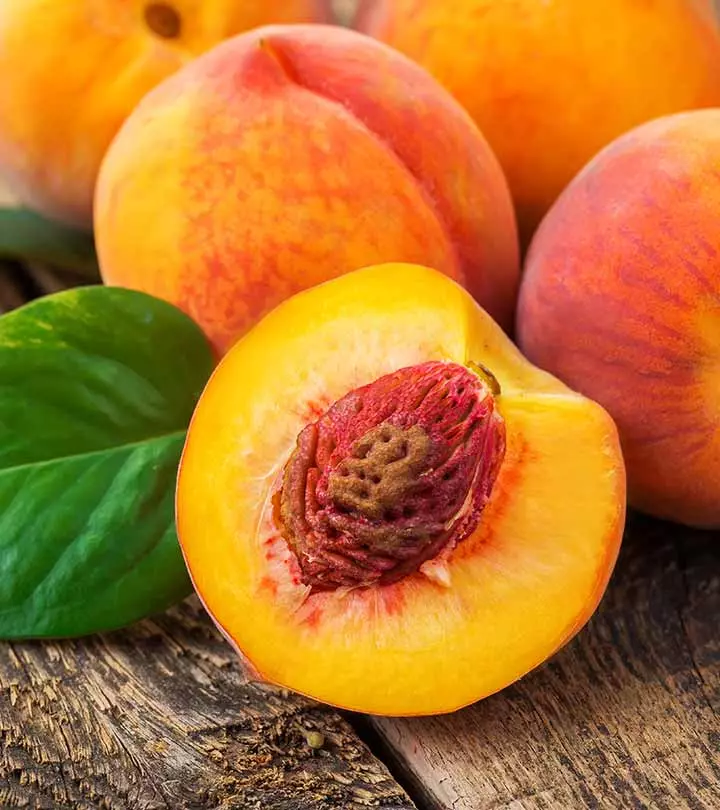






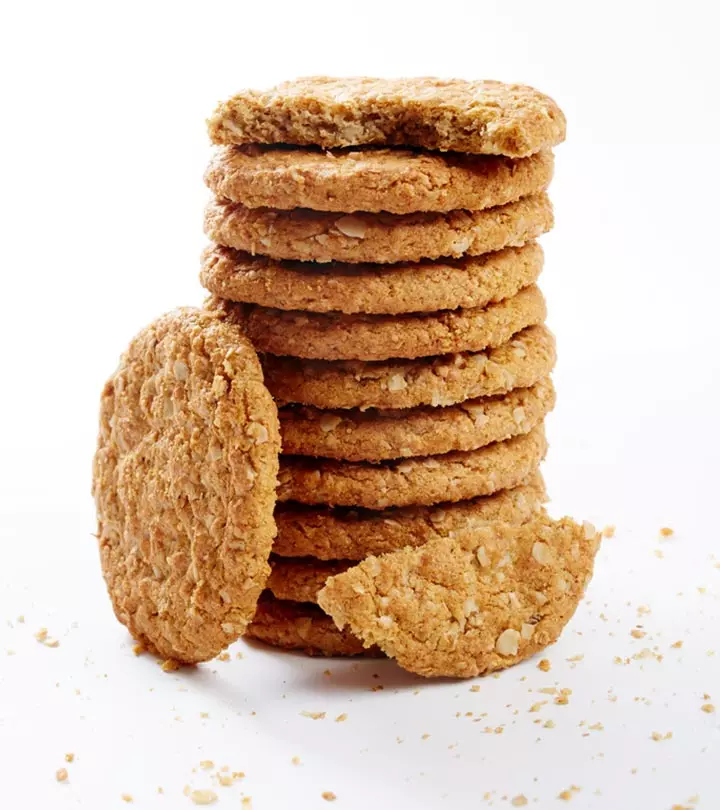




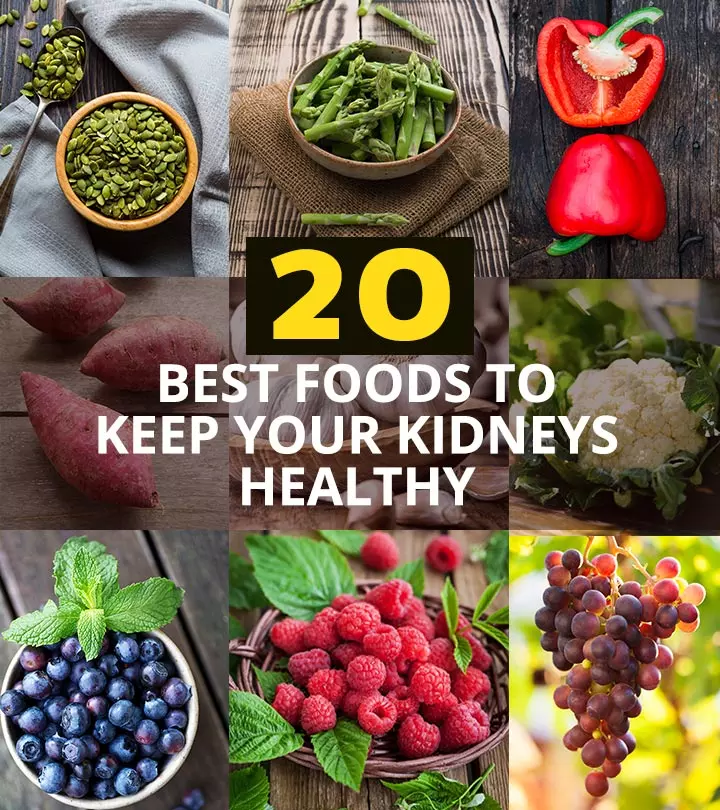



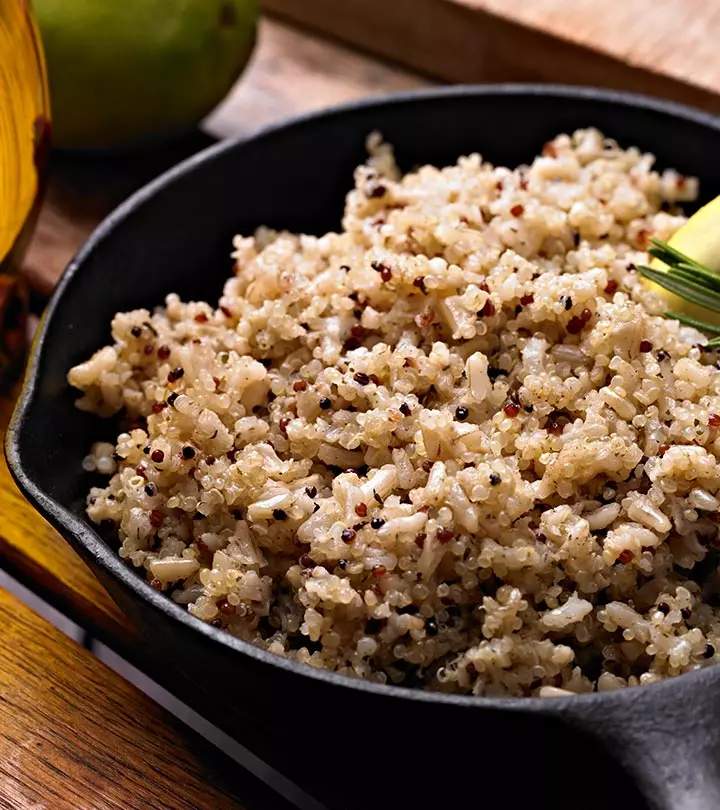
Community Experiences
Join the conversation and become a part of our empowering community! Share your stories, experiences, and insights to connect with other beauty, lifestyle, and health enthusiasts.